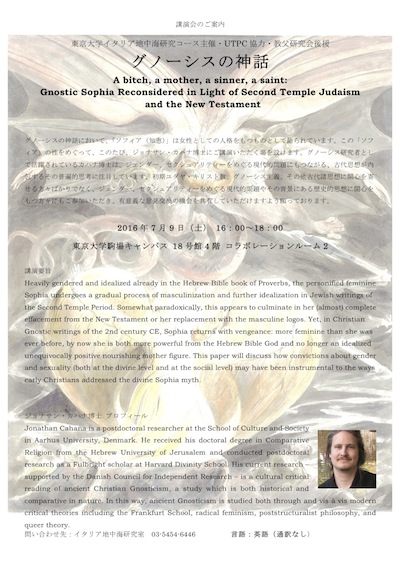
|
Title: | [Related Event] A bitch, a mother, a sinner, a saint: Gnostic Sophia Reconsidered in Light of Second Temple Judaism and the New TestamentFinished |
||
|---|---|---|---|---|
| Date: | 16:00-18:00, Saturday, July 9, 2016 |
Place: | Collaboration Room 2, 4F, Bldg 18, the University of Tokyo at Komaba |
|
A bitch, a mother, a sinner, a saint:
Gnostic Sophia Reconsidered in Light of Second Temple Judaism and the New Testament
Synopsis:
Heavily gendered and idealized already in the Hebrew Bible book of Proverbs, the personified feminine Sophia undergoes a gradual process of masculinization and further idealization in Jewish writings of the Second Temple Period. Somewhat paradoxically, this appears to culminate in her (almost) complete effacement from the New Testament or her replacement with the masculine logos. Yet, in Christian Gnostic writings of the 2nd century CE, Sophia returns with vengeance: more feminine than she was ever before, by now she is both more powerful from the Hebrew Bible God and no longer an idealized unequivocally positive nourishing mother figure. This paper will discuss how convictions about gender and sexuality (both at the divine level and at the social level) may have been instrumental to the ways early Christians addressed the divine Sophia myth.
Lecturer:
Jonathan Cahana is a postdoctoral researcher at the School of Culture and Society in Aarhus University, Denmark. He received his doctoral degree in Comparative Religion from the Hebrew University of Jerusalem and conducted postdoctoral research as a Fulbright scholar at Harvard Divinity School. His current research – supported by the Danish Council for Independent Research – is a cultural critical reading of ancient Christian Gnosticism, a study which is both historical and comparative in nature. In this way, ancient Gnosticism is studied both through and vis à vis modern critical theories including the Frankfurt School, radical feminism, poststructuralist philosophy, and queer theory.
Language: English|Admission Free|No Registration Required







